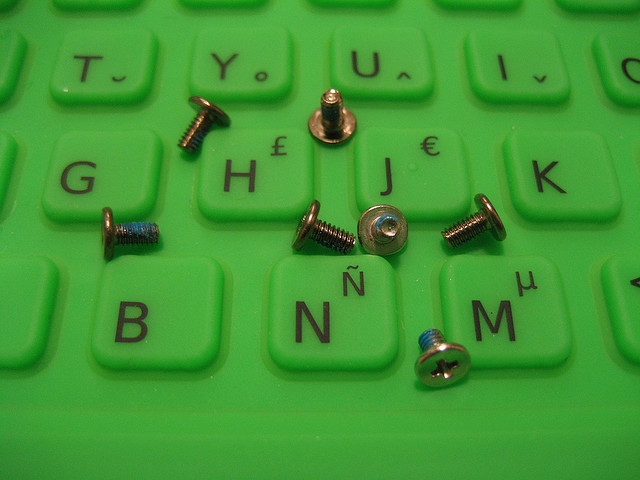Send your question to Umbra!
Q. Dear Umbra,
This fall, I will be going to college. One of the biggest (and most expensive) items on the list is a laptop. My stepmom and I were debating whether it would be more eco-friendly to buy a refurbished laptop versus a new one. Will a refurbished laptop place less demand on rare earth metals and those other nasty resources needed to make electronics, or should I just invest in the newest computer? Please help me settle this debate! I want to be eco-friendly!
Kristen
Chapel Hill, N.C.

Are refurbished laptops the greener way to go? (Photo by Wayan Vota.)
A. Dearest Kristen,
Congratulations — what an exciting time! And my, how things change: In my day, “the list” included things like “towels and flip-flops for the shower.” Those were essentials.
In fact, speaking of essential, is it crazy to think one could get by at college in the current era without a personal laptop? Is part of our national economic and environmental crisis due to the fact that this country’s 20.4 million college students are expected to buy — and then forced to dispose of — a piece of electronic equipment rendered obsolete before they graduate? Are these notions of mine demented?
Demented. So a laptop you must procure, and a laptop you shall have. While I understand your stepmother’s instinct to get the best and bedazzlingest technology, a refurbished model can actually satisfy that need and assuage your eco-concern — if you do some smart shopping.
Let’s look at what “refurbished” actually means. It is not the same as “used” or “secondhand,” and it is not as banged-up as it sounds. In most cases, it refers to a machine that has been barely used, or not at all, by a customer. Once reclaimed — usually by the manufacturer, but sometimes by a retailer or do-gooder nonprofit — it is inspected and given a tune-up as necessary, then sold at a lower price than a brand-new model.

The key to getting a green computer. (Image courtesy of Shutterstock.)
A refurbished computer is akin to a used car, as this fun Gizmodo rant points out. What you are buying is a perfectly good machine that just needs a loving new owner. In fact, it might have even gotten more attention than the “cursory quality-control check” on a new machine, says this CNET fellow. The best part? You’ll save between 10 to 30 percent off the original price, maybe more if you get lucky. And when you’re faced with a staggering list of things to buy for college, every dollar counts.
So is this an eco-friendly choice? Yes. Electronics manufacturing and disposal is notoriously toxic. You will be doing your part to reduce, if ever so slightly, this heap of e-trouble, and you will send a message to manufacturers that recycling is okay in your book.
As for shopping, start with these basics:
- Think about what you need. Maybe it’s just word processing and web connectivity. Maybe it’s something more. Whatever it is, shop online or in a store as if you were buying a new machine, figure out what sort of core RAM processing intelligence boosters you need (note to alert commenters: yes, I know that’s not a thing), then look at refurbished options with those requirements in mind.
- Find the greenest manufacturers and models. This handy EPEAT registry will point you to the companies that are using greener materials and making their machines easier to recycle. Spend some time familiarizing yourself with the industry leaders.
- Hit up the “outlet” stores. Major manufacturers offering refurbished machines through an online “outlet” store include Apple, Dell, Sony, Toshiba, and Lenovo. They usually offer fairly broad definitions of where the machines have been and what they’ve been through (e.g., “Opened, possibly used, tested to pass original specifications”). Big electronics and office-supply retailers also frequently offer refurbished machines, but most experts recommend dealing directly with the manufacturers, if only for peace of mind.
- Get a warranty. On the off chance that you do buy a lemon, you want to have some recourse. Again, the manufacturers should be helpful here: Dell, for instance, offers the same warranty on refurbished products as on similar new ones, and Apple offers a one-year warranty on all refurbished machines. You could even get an extended warranty that will last through your college years.
Here are a few more things to think about as you shop. Now go take the world by storm, Kristen. And don’t forget to write.
Matriculatingly,
Umbra




